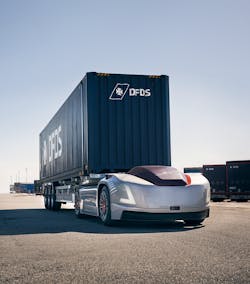Volvo Trucks to deploy Vera, an autonomous transport vehicle, to real-world assignment
Volvo Trucks’ electric, connected, and autonomous vehicle Vera will form part of an integrated solution to transport goods from a logistics center to a port terminal in Gothenburg, Sweden. The assignment is the result of a new collaboration between Volvo Trucks and the ferry and logistics company, DFDS.
The purpose of the collaboration is to implement Vera in a real application, enabling a connected system for a continuous flow of goods, from a DFDS’ logistics center to an APM Terminals port facility in Gothenburg, for distribution across the world.
In 2018, Volvo Trucks presented its first electric, connected, and autonomous solution, designed for repetitive assignments in logistics centers, factories, and ports. Vera is suited for short distances and transporting large volumes of goods with high precision.
“Now we have the opportunity to implement Vera in an ideal setting and further develop her potential for other similar operations,” says Mikael Karlsson, vice president autonomous solutions at Volvo Trucks.
The aim is to implement a connected system consisting of several Vera vehicles monitored by a control tower. The purpose is to enable a seamless and constant flow responsive to demands on greater efficiency, flexibility, and sustainability. The collaboration with DFDS is a first step towards implementing Vera in a real transport assignment on pre-defined public roads in an industrial area.
“We want to be at the forefront of connected, autonomous transportation. This collaboration will help us develop an efficient, flexible, and sustainable long-term solution for receiving autonomous vehicles arriving at our gates, benefitting our customers, the environment, and our business,” says Torben Carlsen, CEO of DFDS.
The autonomous transport solution will be further developed in terms of technology, operations management, and infrastructure adaptations, before it can be fully operational. Moreover, necessary safety precautions will be taken to meet societal requirements for a safe path towards autonomous transports.
As Volvo Trucks gains more experience, Vera has the potential to be used in similar applications as a complement to today’s transport solutions.
“Autonomous transports with low noise levels and zero exhaust emissions have an important role to play in the future of logistics and will benefit both business and society. We see this collaboration as an important start and want to drive progress in this area. Vera may have a speed limit, but we don’t. Testing has already started, and we intend to implement the solution within the coming years,” adds Mikael Karlsson.
Notable:
- The assignment is to move containers from the DFDS logistics center in Gothenburg to an APM terminals container terminal according to needed capacity.
- The autonomous system is monitored by an operator in a control tower who is also responsible for the transport.
- The solution is suited for repetitive flows with a maximum speed of 40 km/h (about 25 mph).
- Infrastructure adaptations are part of the scope in the implementation of the total transport system, including automated gates at the terminals.
- Volvo Trucks and DFDS are main partners but several actors are involved in implementing Vera’s first assignment.
- The initiative is carried out with support from the Swedish Innovation Agency Vinnova, the Swedish Transport Administration, and the Swedish Energy Agency through the Strategic vehicle research and innovation programme FFI.
